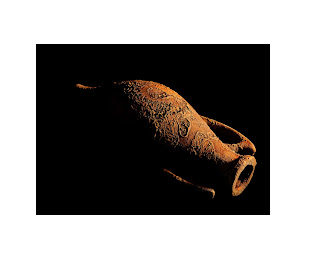To create is to sacrifice. The Christian artist who seeks to glorify the Lord empties himself in order to be filled by Another.
To get inside the head and heart of a character is to offer one's self for the benefit of the reader (if a book) or the viewer (if a film).
To dance is to give sway to the story on God's heart.
To suspend one's own agenda for the sake of the canvas and allow the Holy Spirit full creative run is to sacrifice one's self to the ministry of art. While at the same time allowing the Holy Spirit to uniquely use one's God-given interests and talents in that creation.
This consideration presupposes that the artist has offered himself to God as a willing vessel, as "a channel of blessing" (as the hymn writer notes).
View "Channels Only" piano instrumental with lyrics.
So much cycles back to God's sovereignty and human responsibility. In His creative love, God provides the impetus, and the artist willingly surrenders to it.
For God's glory.
For the recipient's benefit.
For the Kingdom.
It is a losing of one's self in order to find one's self--the full expression of who God fashioned the artist to be for His sovereign purposes.
Artists speak of the "zone" where the creative process takes over as time stops. It is a place of peace. Yet the fruit of the work may not be fully understood or realized this side of heaven.
I wonder if this phenomenon was true for Isaiah. Commissioned to go to a people who would not listen, even in the midst of impending judgment, Isaiah under divine inspiration produced one of the most masterful works of writing, rivaling Shakespeare and Milton in literary expression.
While Isaiah only lived to see a portion of God's prophecies fulfilled, he willingly, sacrificially poured himself out to be filled up and spilled out for God. God's glorious expression through His servant of the birth, life, death, resurrection, and future reign of His Son is magnificently foretold, offering a call to rebellious Israel in particular and the sinner in general who has turned his back on God to come to the Cross for salvation.
Centuries later, Handel uses Isaiah's writing to compose "The Messiah," further impacting generations with the gospel through the art of music.
While the extra-biblical artist cannot lay claim to divine inspiration as in the case of the biblical writers (2 Peter 1:21), s/he can surrender to the Holy Spirit's filling in order to produce art by His power for His purposes (Ephesians 5:18).
The sacrifice begins with an emptied vessel--emptied of self so that the divine Artist can fill him up and flow through him to others.For it is not only the artist's work that God is shaping for His use but the artist herself.






No comments:
Post a Comment